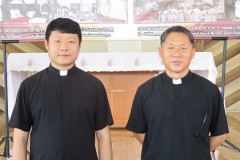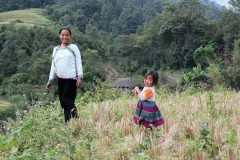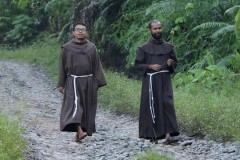
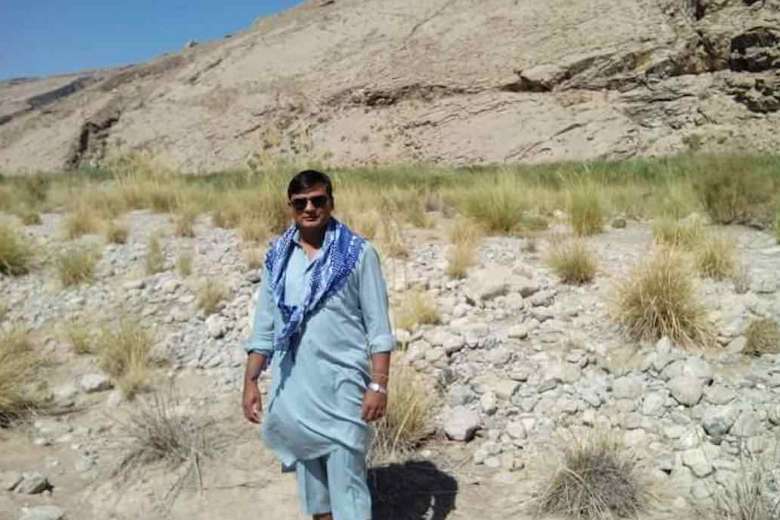
Father Shehzad Anwar at Harnai, a substation of St. Francis of Assisi Parish in Loralai in Pakistan’s border province of Balochistan (Photo supplied)
Each time Father Shehzad Anwar visits Catholics living scattered in Quetta city on the Pakistan-Afghanistan border, having a Baloch or Pushto-speaking guide is as important as carrying the Mass kit or having a car with a tank full of petrol.
The 36-year-old diocesan priest has learned the essential lessons in his pastoral ministry in Quetta, the capital of Balochistan, Pakistan’s largest province dominated by ethnic Baloch and Pashtun people.
The ethnic Punjabi priest serves as a parish priest of St. Francis of Assisi Church in Loralai, a district famed for marble quarries, about 154 kilometers east of Quetta.
The mission in the mineral-rich and sparsely populated province, bordering Iran and Afghanistan, is extremely challenging and threatening, Father Anwar says.
It is not just because of long-distance travel in the hilly, rugged terrain. For decades, the region has been a battlefield plagued by terrorism, a separatist insurgency and heavy-handed military operations. Deaths from shootings and bombings are routine affairs.
A local guide saves priests like Father Anwar from uncomfortable situations such as grilling from security forces and even gun-toting extremist groups.
“Police, paramilitary Frontier Corps or anyone can stop you on the terrain that has streams and narrow mud roads,” the priest told UCA News.
Father Anwar says often the military won’t understand when he introduces himself as a father or Roman Catholic priest.
“We then introduce ourselves as mullahs of Christians. Again, many don’t even know about Christians or Masihi. Ultimately, they take us as preachers of Isai or bhangis [low-caste sweepers].”
Isai is a popular Urdu word referring to Christians, while Masihi or Masih (Messiah) are added after the names of male Pakistani Christians having no surnames. Pakistani Muslims also call Christians by the abusive term bhangi in reference to the many Christians working as cleaners across the country.
In Pakistan, ethnic identity also poses a major challenge in faraway remote regions outside Quetta. Ethnic groups like the Baloch and Pashtun see Punjabis as oppressors due to the long-held dominance of Punjabis at all levels in Pakistan including politics, bureaucracy, military, economy and culture since the birth of the nation in 1947.
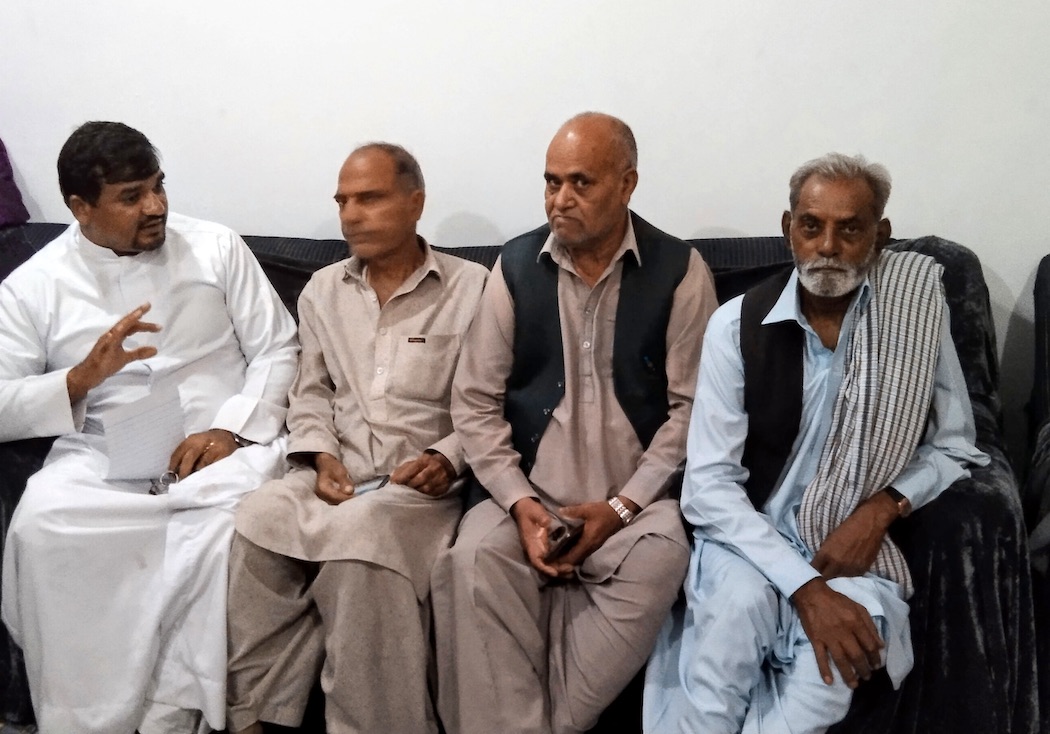 Father Shehzad Anwar discusses issues of the Christian community with elders of Zhob district in Balochistan province during a pastoral visit.
Father Shehzad Anwar discusses issues of the Christian community with elders of Zhob district in Balochistan province during a pastoral visit.
Long-distance mission
Often security officials in Balochistan get cautious when they see computerized national identity cards issued by Punjab's provincial government.
“Queries then focus on our job and department. Being a Punjabi, there is always a fear of a targeted killing or car snatching. We hardly catch a break on the way. Baloch belts are riskier than Pashtun regions. The fear only ends when we step inside the secured parish houses,” Father Anwar said.
The local church’s substations are nestled in narrow valleys hemmed in by rugged mountains. None have parish houses, which means priests need to make their own arrangements to spend the night to ease their tiredness.
“Overnight stays are common due to the long distances. We take additional Bibles and other documents like birth certificates and family collection cards to facilitate such families on their doorstep,” the priest explained.
Such long and difficult trips can be awfully exhausting, said Father Anwar, recalling his visit to Harnai district last year.
“We had to travel for more than three hours to celebrate Mass for a single Catholic family in that district,” he said.
Financial challenges are also a roadblock. Parishes are not well off and the expenses, even excluding fuel costs, are an economic burden for the clergy.
“Yet I visit them after one or two months. In cases of funeral or marriage, additional long-distance traveling is a must,” Father Anwar said.
The mission for non-local priests can also be frustrating at times when they are unable to visit their own ailing family members in time due to commitments in their parishes.
“Some priests couldn’t see their parents and siblings for the last time,” he recalled.
Milkman’s son
Father Shehzad Anwar’s life as a dedicated missionary resembles what Western missionaries did when they evangelized and nurtured the Catholic faith across Asia decades ago.
However, Father Anwar says, he never dreamt of such an adventurous life as a child.
He was born to a poor family in Faisalabad of Punjab. His father delivered milk to people in Nasrat colony on his bicycle to feed his eight children.
Despite the endemic poverty, his father was a devout Catholic.
“He used to read the Bible aloud early morning and before going to bed. It was the first voice we used to hear in our small house. He used to explain the passage in the evening,” Father Anwar recalled.
This is how the seed of religiosity was planted in the heart of the young boy. Eventually, he joined St. Thomas the Apostle Minor Seminary in 2003.
As a seminarian, he came across a legendary Sri Lankan missionary, the late Oblate Bishop Victor Gnanapragasam, who is hailed as the pioneer of the Catholic Church in Quetta. He founded the Apostolic Prefecture of Quetta in 2001 and served the region until his death last year.
Father Anwar was among six students adopted by Bishop Gnanapragasam, who bore all their seminary expenses starting from 2005.
During that period Quetta had eight priests and 12 religious serving about 27,000 local Catholics. Bishop Gnanapragasam commissioned 19 new churches, established various episcopal commissions and ordained several diocesan priests.
He also promoted three housing projects for poor, homeless Christians.
Due to difficult and often hostile environments, the local Church lacked priestly and religious vocations and largely relied on priests and religious from other provinces. The back-up plan was equally challenging.

Father Anwar discusses security issues with Colonel Hammad of the Frontier Corps' Loralai squad in Balochistan. (Photo supplied)
Father Anwar recalled that Bishop Gnanapragasam faced pressure as priests found it extremely difficult to adjust to local challenges. However, he learned the art of adjustments through tireless efforts over the years.
“The exposure during month-long pastoral works, in summer vacations, introduced us to a totally different world,” the priest said.
He also pointed out differences in church services in Quetta with those in cities in Punjab and Karachi.
“Churches in Punjab and Karachi host two or three services before 9 in the morning. Here the first Mass starts at 9 am and a church full of worshippers is a rare sight,” he says.
There are a handful of church-run clinics and hospitals in other dioceses, but there are none in Quetta.
One year after he was ordained a priest at the Cathedral of Saints Peter and Paul in Faisalabad in 2016, Father Anwar embraced his mission in Quetta, where he has served three parishes.
He currently has an additional role as the vice-chairman of the Catholic Education Board in Balochistan, overseeing the operations of six church-run schools.
Father Anwar is one of 14 Punjabi priests serving in seven parishes in Quetta. There is only one priest from the Archdiocese of Karachi in southern Pakistan.
Caritas Pakistan, the social service agency of the local Church, is also active in one of the country’s poorest and most sparsely populated church jurisdictions, where more than 5,000 Catholic families live alongside Muslim-majority communities.
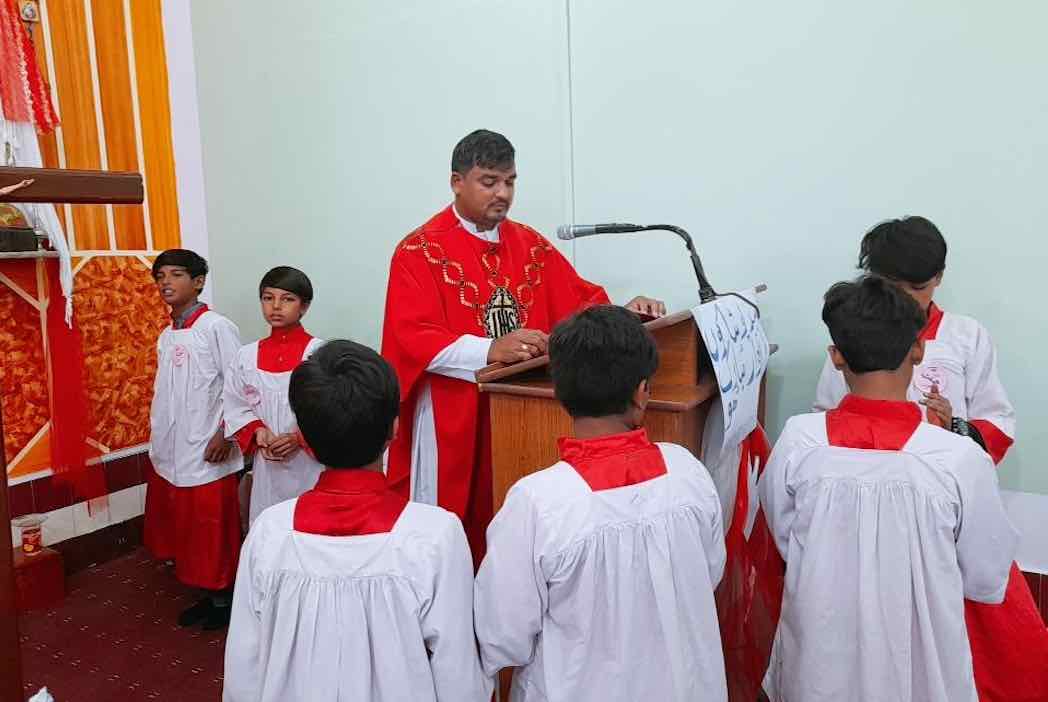
Father Anwar celebrates Mass at St. Francis of Assisi Church in Loralai in Balochistan province. (Photo supplied)
A church in transition
The Catholic Church in Quetta has been entrusted to the Missionary Oblates of Mary Immaculate congregation since 1982. Until now, the Apostolic Vicariate of Quetta produced two Balochi priests, both Oblates, serving in other dioceses.
In January, Capuchin priest Father Khalid Rehmat was appointed the new bishop.
During his consecration ceremony on March 25 last year, apostolic nuncio Archbishop El-Kassis, the main celebrant, reminded the new prelate that attracting local vocations and the formation of future priests are his major challenges.
Father Anwar says the transition of the church in Quetta since the departure of the late Bishop Gnanapragasam is a positive development.
The Sri Lankan bishop had various challenges. Due to advanced age, his movement was limited and, being a foreigner, he couldn’t reach everywhere and relate to the people. He often sought to reduce his workload and, due to the language barrier, he never delivered homilies during large gatherings, the priest explained.
Despite such hurdles, the prelate became a good shepherd to the Catholic community.
“Still, we remember our good shepherd for leading the Church in very challenging circumstances. I thank him for trusting in us to carry on his legacy,” he said.
Since taking charge, Bishop Rehmat has also been following the footsteps of his predecessor. Pastoral visits to houses and customary dining with families are frequent now.
A strife-torn frontier
The Church’s mission in Balochistan has endured the brunt of one of the longest-running conflicts in South Asia.
Noted for its extremely dry desert climate and unique culture blended with folk music, handicrafts, arts like drama and cinema, coupled with traditional values of mutual respect, Balochistan’s long history is also marred by civil strife and a deadly separatist insurgency for decades.
Analysts say much of the region’s conflicts and nationalist insurgency can be traced to frequent changes to its dominion and borders starting as early as in the 17th century and culminating in the formation of Pakistan at the end of British colonial rule in 1947.
Moreover, despite being a mineral-rich region with natural resources like gas, oil, coal, copper, sulfur, fluoride, marble and gold, Balochistan remains Pakistan’s least developed province, making it a perfect breeding ground for unrest and violence.
In recent times, armed separatists have been demanding greater autonomy and a bigger share of the province’s natural resources, which escalated the blood-letting conflict. Thus, in travel advisories, Balochistan is categorized as an unsafe region.
 Father Anwar with the cricket team of St. Francis of Assisi Parish. (Photo supplied)
Father Anwar with the cricket team of St. Francis of Assisi Parish. (Photo supplied)
Both the insurgent groups and the military are accused of violence and enforced disappearances as they wage a battle for supremacy in the province.
The state-run Commission of Enquiry on Enforced Disappearances has registered 537 cases of disappearances since 2011.Only seven persons were traced to prisons and 30 dead bodies were found. Altogether the commission had traced 222 victims of disappearances as of 2020.
Shooting and blasts have become more frequent in recent times.
Seven people, including a police official, were injured in a blast in Quetta's Nawa Killi area on Nov. 13. Two security personnel were killed on Nov. 24 when gunmen sprayed bullets on a checkpoint in the coastal region of Makran.
In 2013, Bishop Gnanapragasam narrowly escaped death when a bomb exploded near his residence. In 2017, two suicide bombers struck a Methodist church in Quetta while children were rehearsing a Christmas play. Nine people were killed and 57 were wounded.
Such a volatile environment prompted the Church to beef up security measures for safety.
“Sadly, the terrorists have easy access to our border area. Both private and hired guards are stationed at the bishop’s house that also houses four schools in a gated compound. Before organizing church programs, applications for security and surveillance are submitted to police and the Frontier Corps,” said Father Anwar.
Sectarian violence
Balochistan is also known as a boiling pot of sectarian violence.
The Balochistan government faced a national backlash for allegedly spreading Covid-19 after it failed to quarantine Shia pilgrims who visited Taftan in Iran last year.
By April 2020, an anti-Shia campaign called “Shia virus” became a trending topic on Twitter.
The Human Rights Commission of Pakistan recorded at least eight sectarian attacks by militant groups across Balochistan, including four attacks on the Shia Hazara community, last year.
The provincial commission for minority rights, formed in 2019, has limited functions.
The Shia Hazara community is a soft target for sectarian violence, which has intensified since the emergence of extremist groups pledging allegiance to the Islamic State, which is extremely intolerant of Shias.
This climate of fear and violence has led to official restrictions and strict surveillance from security forces. Any individual or organization must obtain a no-objection certificate to travel or work in most areas. It effectively bars foreign aid workers, rights activists and church workers from having adequate access to the mountainous region even during a humanitarian crisis.
Last month, after twin earthquakes killed 50 people in the northwestern district of Harnai, Caritas Pakistan failed to obtain a no-objection certificate to carry out relief work.
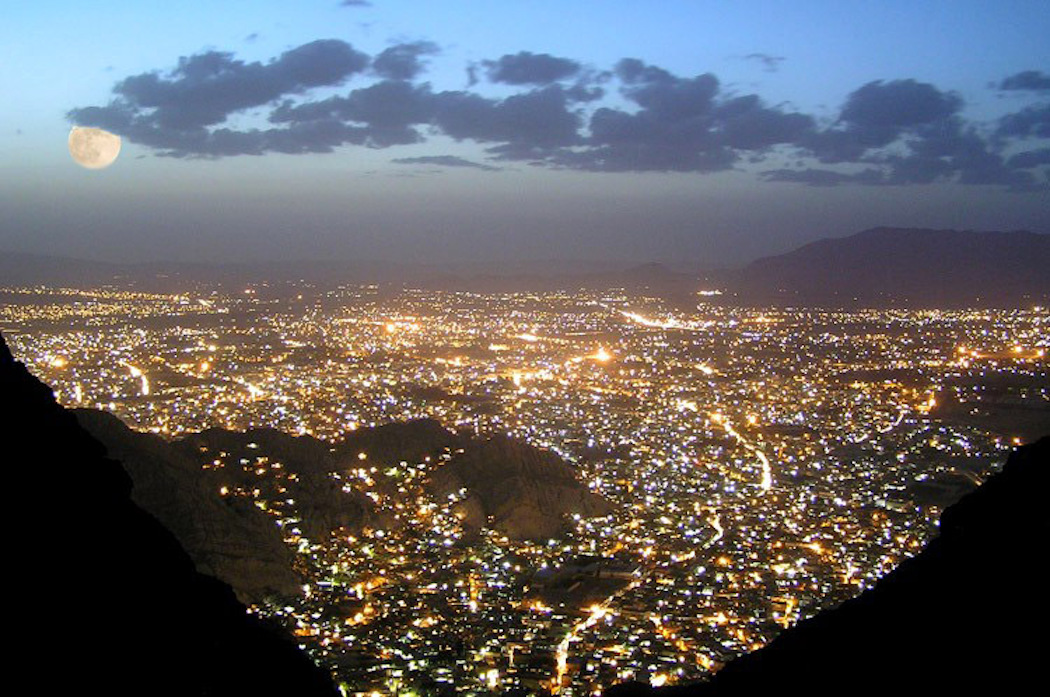 Quetta, capital of Balochistan, at night (Photo: Wikimedia.com)
Quetta, capital of Balochistan, at night (Photo: Wikimedia.com)
Human development — the way out
The Church and Caritas in Quetta see human development as a way out of the perennial problems in the region.
Sharafat Sharif, executive secretary of Caritas in Quetta, pointed out that Bishop Rehmat has sped up the housing schemes for Christian envisioned by the late bishop.
“Christians are being encouraged to inhabit the plots with easy installment-based payments. After spiritual development, his main priority is promoting education among poor Christians,” he said.
Last August, Caritas launched three non-formal education centers with Catholic nuns from the Holy Family congregation collaborating with Caritas teachers in their education ministry in Basti Panchayat, the largest Christian settlement in Balochistan with about 1000 families.
Thanks to Caritas support, 40 local Christian youths have been admitted to Allama Iqbal Open University recently.
The shantytown is, however, notorious for drug and alcohol abuse. It came under the national spotlight in November last year when a video of a tortured Christian sanitary worker went viral.
Qamar Bhatti was allegedly kidnapped by three Muslims who stripped him naked, recorded the assault and uploaded the video on the internet.
Last September, two local Christians, both of them in their 30s, committed suicide. Their families blamed financial woes for the tragedy.
Amid numerous sad stories involving Christians and other minorities, there are also rays of hope for the communities.
Maria Shamaoun, a Quetta-based evangelist, recently scored the top position in the competitive Balochistan Public Service Commission examinations.
“She is the first Christian woman to become an assistant commissioner in the province. It’s our Christmas gift,” said Sharif.

Students of Caritas Pakistan Quetta Community Education Center celebrate Teachers' Day on Oct. 5, 2021, at Basti Panchayat, Quetta. (Photo: Sharafat Sharif)
Era of foreign missionaries is over
The organized Catholic mission began in the area in the 17th century, when it was considered part of the Vicariate of the Great Mogul, which at the time covered the whole of northern India including present-day Pakistan. It became part of the Bombay Archdiocese in the 18th century but in 1832 the Vatican entrusted the area to the Mill Hill Missionaries, making it part of the Afghan mission.
Jesuits and later Franciscans also worked in the area until 1982, when the mission area was given to the care of the Oblate Missionaries.
The Oblate mission began when Franciscan Bishop Bonaventure P. Paul of Hyderabad Diocese asked Father Bernard Quintus, the Oblate provincial in Sri Lanka, to send missionaries to serve in Quetta.
In 1981, two Oblates arrived in Quetta Parish who glanced through the church and its 17 substations. A year later, the Quetta mission was officially entrusted to the Oblates, with Father Theogenes Joseph becoming the first parish priest.
In those days, life in Quetta was no less hard, but the missionaries made their best efforts to keep the faith alive and prepared laypeople to work in their own communities.
The Quetta mission currently has some 30,000 Catholics, forming 0.4 percent of 7.2 million mostly Muslim people.
“A priest could not go to every substation due to the vastness of the parish and a shortage of priests in the diocese. Father Theo involved the lay faithful in the ministry of education and in conducting the prayer services. The best thing done by Father Theo was to ensure discipline in everything, such as Sunday schools, choir groups, and liturgical celebration and in the parish records,” states the website of the Oblate Missionaries in Pakistan.
The endeavors paid off. In 2001, Pope John Paul canonically erected the Apostolic Prefecture of Quetta.
There is no foreign priest in Balochistan today. The last missionary priest, Oblate Father Renald Lawrence, former attorney of Quetta, returned to Jaffna, Sri Lanka, last September.
Two Sri Lankan nuns, from the Good Shepherd and Holy Family congregations, are still active in Quetta.
Father Cecil Paul, a Quetta-born Oblate priest, noted that the age of foreign missionaries is coming to an end.
“The age of missionaries is over. The increasing terrorism added to this exodus,” Father Paul said.
Father Paul moved to Germany for higher studies in 2012. On his return to Pakistan two years ago, he started serving Lahore Archdiocese in Punjab province.
As the national director of Oblate media, he launched a website as a tribute to the Sri Lankan missionaries who toiled for the mission in Quetta.
The departure of foreign missionaries is both a blessing and a challenge.
“The local leaders are bringing more variety,” he said. “However, the goras [white people] used to bring foreign funding for charity work. The local faithful grew accustomed to being helped by the Church. The local vocations are mostly from poor families. We are challenged by a lack of resources."
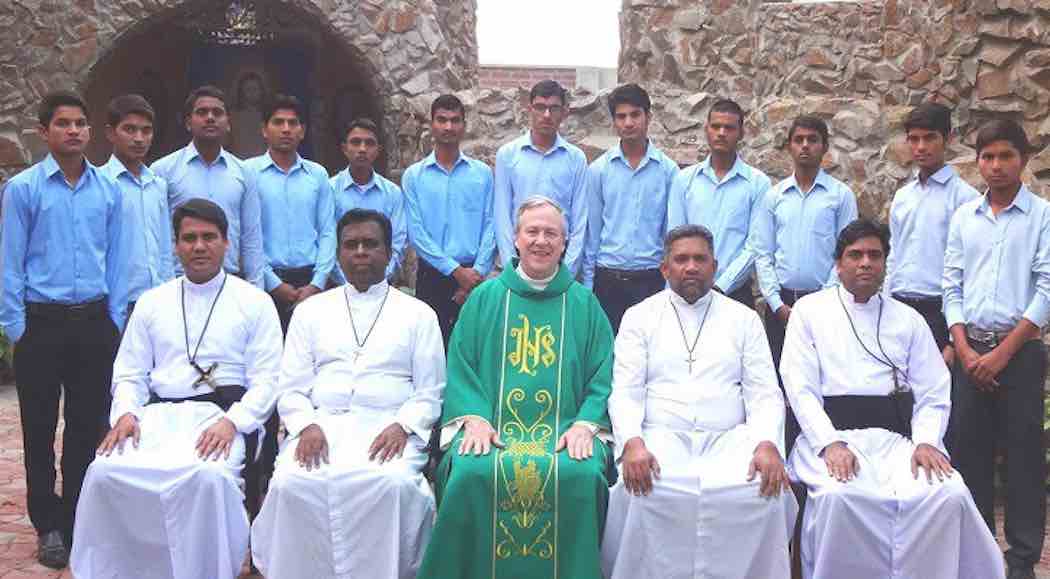
Superior General Louis Lougen (center) visits the Oblate Juniorate in Multan, Pakistan. (Photo: omiusa.org)




